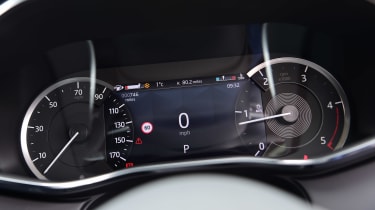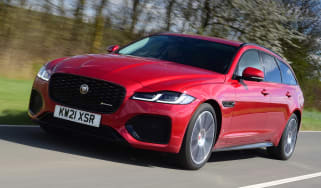Jaguar XF Sportbrake review - MPG, running costs & CO2 (2017-2024)
Decent economy and reasonable CO2 emissions count in the Jaguar XF Sportbrake’s favour – although rivals are cheaper to run
Order your Jaguar XF Sportbrake with the 201bhp 2.0-litre diesel engine and you’ll officially return between 50.6 and 51.9mpg. Those are strong enough figures, with the Mercedes E-Class Estate E 220d managing 50.4mpg.
Jaguar XF Sportbrake MPG & CO2
In fairness, a couple of extra mpg here and there is unlikely to have a huge effect on your decision-making process, but the XF Sportbrake’s CO2 emissions may.
The 201bhp 2.0-litre diesel’s figure of 142g/km isn’t too bad. Prior to it going off sale the most recent Mercedes-Benz E220d returned a figure of 148g/km (with economy up to 50.4mpg), though a BMW 520d M Sport was a touch lower, at 56.3mpg and CO2 of 125g/km, with attendant benefits in terms of company car Benefit in Kind rates.
Other XF engines are less efficient, although none prohibitively so. The P250 petrol is available only in R-Dynamic SE trim and has official figures of 34.3mpg combined economy, and 188g/km of CO2, while the 300 Sport, with the P300 engine, is only slightly behind on 31.8mpg and 202g/km, some of that difference down to its slightly less efficient all-wheel drive layout.
All XF Sportbrakes now cost more than £40,000 brand new, which means while your first year VED or ‘road tax’ rate will be decided based on CO2 emissions – so that’s around £250 for the D200, £1,000 for the P250 and £1,500 for the P300 – you’ll pay a tax surcharge in years two to six of registration. This currently means a bill of £570 per year, which would then drop down to £180 per year thereafter (subject to changes).
Insurance groups
With recent changes to the engine range removing some of the less powerful models, the XF Sportbrake now unsurprisingly starts at slightly higher insurance groups than before. The D200 diesel starts in group 36 out of 50, and this rises to group 40 for a P300.
Warranty
Jaguar’s three-year, unlimited mileage warranty is average for the industry, but no more than that. Audi offers three years or 60,000 miles, while BMW and Mercedes’ policies match Jaguar, with three-year, unlimited mileage terms.
Servicing
Jaguar’s service plans are worth considering if you’re a private customer. A five-year/50,000-mile plan is £650 for 2.0-litre diesel saloons, while the 3.0-litre diesel is around £800 and petrol models cost just over £950 for the same period.














